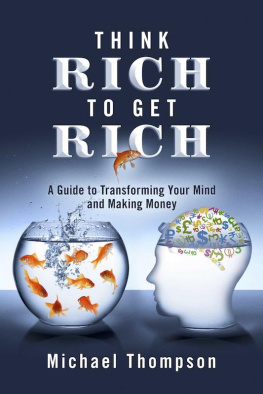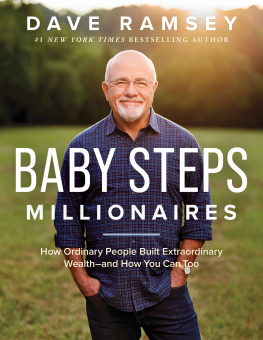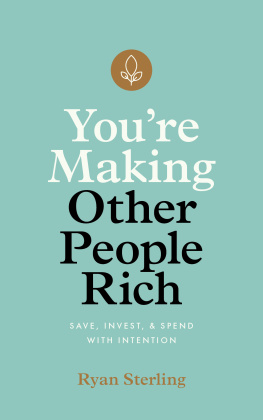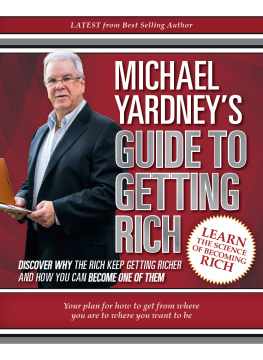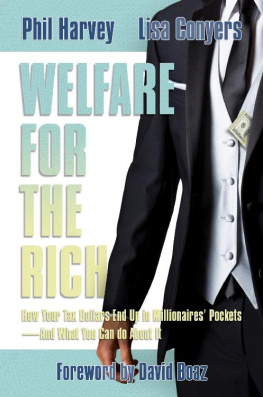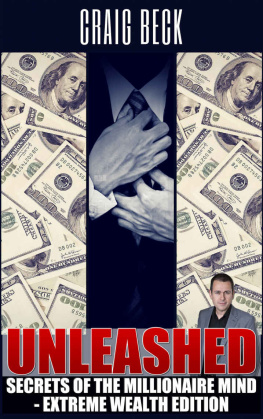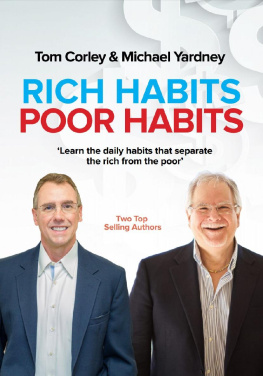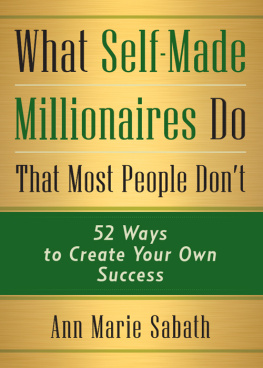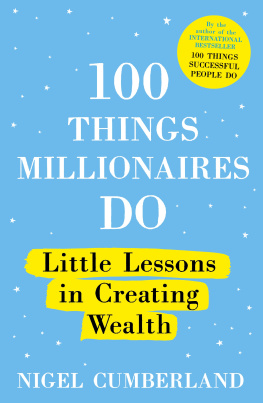To Dawn Andrews Siebold, my wife, muse, and best friend. Thanks for your ongoing support and encouragement during this project. Youve always been my number one fan, and your endless enthusiasm for my work has inspired me for the last 26 years.
To Brenda Robinson, my editor, for your patience and guidance with this book.
To Sandra Larson, my graphic designer. I can always count on you.
To Bruce Serbin, my publicist, for your dedication to helping us spread the mental toughness message worldwide.
.
Introduction
This book isnt about money. Its about thinking. Each short chapter represents one of the lessons Ive learned over the past 26 years interviewing some of the richest people in the world. Every chapter compares the middle class and world class. These terms reference the average person versus the world-class thinker. The idea is to compare the way most people think about money in contrast to the rich. The differences are as extreme as they are numerous.
When I started this journey in 1984, I was a college student, completely broke and searching for answers about success I wasnt finding in the classroom. My discoveries along the way changed my life, and I wrote this book to give you the same opportunity. If you follow the beliefs, philosophies, and strategies of the rich and take action, you have a legitimate shot at becoming a millionaire. The secret is not in the mechanics of money, but in the level of thinking that generates it. Once you learn to embrace this, your earning potential is limitless.
If you find yourself saying; not all rich people believe this or do that, youre right. I based these comparisons on what the majority of rich people shared with me. This also applies to what I say about the masses.
I interviewed rich people because I wanted to be rich. What I discovered was, to get rich, I had to learn to think like a rich person. I spent the first 25 years of my life thinking about money like the masses, which kept me broke. Once I changed my thinking, the money started to flow. The changes began with my thinking, which led me to take effective action that eventually made me a millionaire. Dont be impressed or intimidated by my success or anyone elses, because you can do exactly the same thing. Let this book be your guide.
I wish you the best of luck on your journey. Please let me know how youre progressing by visiting www.mentaltoughnessblog.com and sharing your story.
All the best,
Steve Siebold
July 4, 2010
Gainesville, Georgia
.
1 ~ Middle class focuses on saving World class focuses on earning
Driven by the fear of loss and uncertainty of the future, the masses focus on how to protect and hoard their money. While world-class thinkers understand the importance of saving and investing, they direct their mental energy toward accumulating wealth through serving people and solving problems. When an economic correction occurs, the fear-based saver suffers catastrophic losses that may take years to recover. While world-class thinkers suffer similar losses, they quickly turn their attention to financial opportunities that present themselves in a society of suddenly terrified people. While the masses are selling for short-term survival, the great ones are buying for long-term success. One group is operating from fear, the other, from abundance. The self-made rich arent afraid to take calculated risks, because they know if they lose they can make it all back. While the middle class is always looking for the home run investment that will make them wealthy, the world class invests wisely, knowing the bulk of their fortune will come from the service they provide. Most people are more concerned with the modest gains they accumulate from their savings and investments than they are with using their billion dollar minds to create a fortune. The masses are so focused on clipping coupons and living frugally they miss major opportunities. Even in the midst of a cash flow crisis, the rich reject the nickel and dime thinking of the masses. They are masters at focusing their mental energy where it belongs: on the big money. How about you? Are you more focused on saving pennies or building an empire? Your current financial status will give you an idea of your past thinking. If youre rich, keep thinking the way youre thinking. If not, maybe its time for a change.
Money is power, and you ought to be reasonably ambitious to have it.
Russell Conwell
~ Rich Resource:
The Rich: A New Study of the Species by William Davis
~ Critical Thinking Question:
Based on your past behaviors and results, are you thinking big or small?
~ Action Step:
Make a decision today to think bigger and maximize your money potential.
.
2 ~ Middle class thinks about money in linear terms World class thinks about money in non-linear terms
The masses trade time for money. This creates the belief that making money is a linear process directly connected to time. The average person believes the only way to earn more money is to work more hours, with the exception of raises and bonuses. The wealthy know big money requires thinking about it in non-linear terms. The great ones are masters at generating money through ideas that solve problems. They realize since there is no limit to ideas, there is no limit to how much money they can earn. So while the middle class is scrambling to survive and frightened for their financial future, the world class is capitalizing on their elevated level of awareness. The masses waste a substantial percentage of their mental energy worrying about money, while the champions are fearlessly directing their focus to becoming wealthier every day. Fortunes can be created almost overnight with the right idea at the right time, but only if the performer understands this non-linear phenomena. Since most people think of making money in a linear fashion, they never invest the necessary effort to create high impact solutions. The truth is, people who educate themselves in this philosophy have the potential to become as wealthy as they wish. And while this has been proven again and again, the average persons refusal to believe this holds them back from ever getting started. This is another reason on the long list of why the rich get richer, and the poor, poorer.
The entire essence of America is the hope to first make moneythen to
make money with moneythen make lots of money with lots of money.
Paul Erdman
~ Rich Resource:
The Intelligent Investor by Benjamin Graham
~ Critical Thinking Question:
When youre problem solving, do you spend more time looking for the obvious answer or the non-obvious answer? Linear thinking is the obvious and non-linear thinking is the unobvious .
~ Action Step:
Always look for the obvious, simple, linear solution first. If that doesnt work, start brainstorming the unobvious, more complex, non-linear solutions.
.
3 ~ Middle class believes hard work creates wealth World class believes leverage creates wealth
If hard work was the secret to financial success, every construction worker and cocktail waitress would be rich. The wealthy strategically focus their efforts on the most profitable areas of their business while leveraging their contacts, credibility and resources to maximize the results of every action they take. World-class performers work hard, but not in the traditional sense. Hard work to the wealthy means out-thinking their competitors and leveraging the collective brainpower of their advisors. The middle class sees hard work as a badge of honor. The world class sees success as a more important badge of honor. While one group is mentally and physically exhausted at the end of the day, the other is fresh and excited about thinking of new solutions and ideas that will keep the first group employed. As a result, the middle class lives paycheck to paycheck and the world class lives without limits. The only real difference lies in their approach and ability to use leverage in place of linear effort.


